THE KING OF SCOTLAND
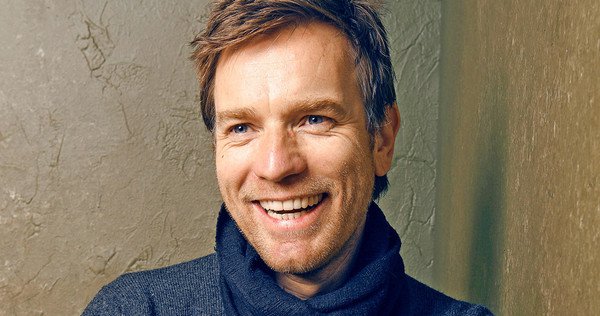 It’s a cool gray day and I’m climbing a dormant volcano with Ewan McGregor. We’re halfway up Arthur’s Seat, a rocky summit that looms over Edinburgh’s medieval Old Town. Robert Louis Stevenson once described this promontory as “a hill for magnitude, a mountain in virtue of its bold design,” which is Scottish for “steep as shite.” I’m already winded. McGregor is as chipper as a puppy going for its morning walk. When I stop to catch my breath and soak up the view, he flashes me a grin—that terrific, lupine Ewan McGregor grin—and announces that he can already see tomorrow morning’s tabloid headline: EWAN KILLS JOURNO AT LAST. He tips his head back, laughing, and pats me on the sweaty shoulder. Then he gambols up the stony path.
It’s a cool gray day and I’m climbing a dormant volcano with Ewan McGregor. We’re halfway up Arthur’s Seat, a rocky summit that looms over Edinburgh’s medieval Old Town. Robert Louis Stevenson once described this promontory as “a hill for magnitude, a mountain in virtue of its bold design,” which is Scottish for “steep as shite.” I’m already winded. McGregor is as chipper as a puppy going for its morning walk. When I stop to catch my breath and soak up the view, he flashes me a grin—that terrific, lupine Ewan McGregor grin—and announces that he can already see tomorrow morning’s tabloid headline: EWAN KILLS JOURNO AT LAST. He tips his head back, laughing, and pats me on the sweaty shoulder. Then he gambols up the stony path.
In Edinburgh, Scotland’s capital, McGregor hardly needs to kill an out-of-shape journalist to get tabloid attention. He’s here filming the sequel to Trainspotting, the 1996 film that put him on the map as an actor, and the city is pulling for the cast and crew as if they were Scotland’s World Cup team. The original Trainspotting, a black comedy about a cluster of criminally hapless heroin addicts, is beloved here, as it is across Great Britain. (London’s The Observer named it the best British film of the last twenty-five years.) Photographs from the sequel’s shooting fill the front pages of Edinburgh’s newspapers. Teeming crowds gather around roped-off set locations. “I’ve never seen the like of it,” McGregor says about the mania. “People just standing there with a million cell phones, you know?”
Hiking is what he does to relax, to disappear, to flush his lungs with ozone. But there’s only so much disappearing you can do in Edinburgh when you’re Ewan McGregor. Today he’s semi-incognito in a drawstring sweatshirt, jeans cuffed at the ankle, and hiking boots, with a wool newsboy cap pulled down low over his forehead. But every ten minutes or so, a woman passing us on her way down the mountain does a double-take, screams like a teenager, and asks for a photograph. To the first one he politely says no, he doesn’t do photos when he’s out and about. This, he quickly realizes, will be a losing battle. To everyone else who asks, he happily obliges. Everyone gets, for posterity, exactly half of a trademark Ewan McGregor grin.
Near the top, we pause to discuss obscenities because, walking upward, I have unleashed a string of them. Does Irvine Welsh, the Scottish author of the novel Trainspotting and its sequel, Porno, I ask, use the c-word as often in person as he does in print? McGregor nods yes. Deploying it isn’t a big deal in Scotland, he says, where it’s “a bit like calling someone a prick.” In America, he asks, “it’s horribly offensive and really, really associated with the female genitalia, right?” I answer yes; it’s essentially America’s last taboo word. He considers this and says about the Scots, his blue eyes gleaming, “Maybe we have a healthier relationship with the vagina.”
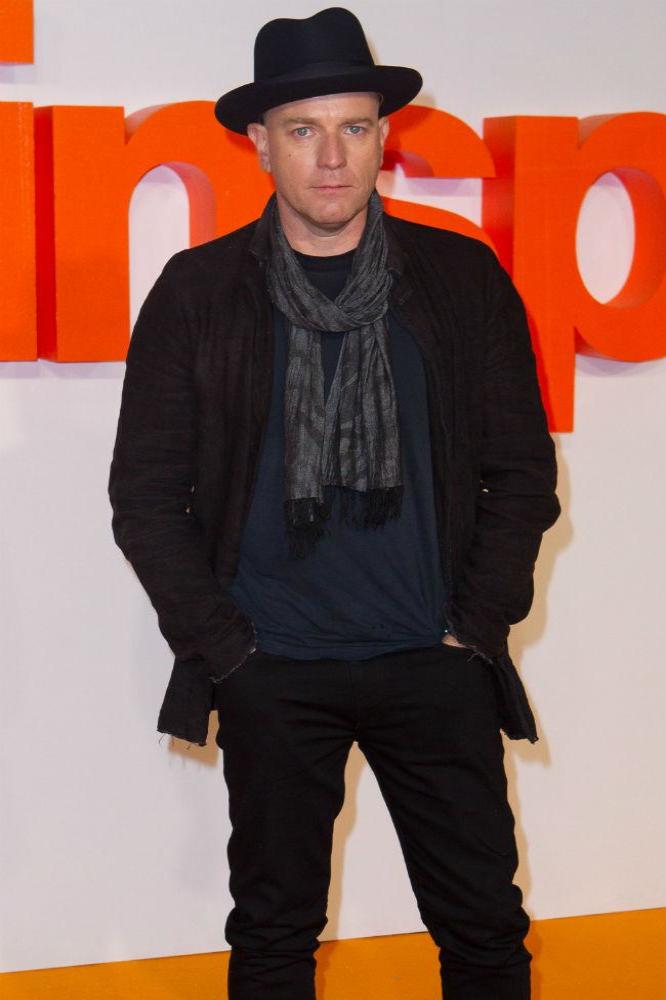 The IMAX view from up here—undulating green hills, charcoal sky, ancient city, cobalt sea—is absurdly beautiful. McGregor points north, toward Crieff, Scotland, the small country town, fifty miles away, where he grew up. He also points to city blocks in Edinburgh, spread below us, where he spent some time as a teenager. Filming here feels like a homecoming.
The IMAX view from up here—undulating green hills, charcoal sky, ancient city, cobalt sea—is absurdly beautiful. McGregor points north, toward Crieff, Scotland, the small country town, fifty miles away, where he grew up. He also points to city blocks in Edinburgh, spread below us, where he spent some time as a teenager. Filming here feels like a homecoming.
We’ve reached the summit of Arthur’s Seat. It’s tempting to say about the air up here what Renton, McGregor’s character in Trainspotting, said about a heroin rush: “Take the best orgasm you’ve ever had, multiply it by a thousand, and you’re still nowhere near it.” Or maybe I’m just happy to catch my breath. We take photographs of each other standing at the summit cairn. McGregor tells me he’s pleased to be working with director Danny Boyle again. They’ve patched up an old friendship. But T2 isn’t the movie that’s most on his mind. Mentally, he’s back in Pittsburgh, where he recently directed his first film, an adaptation of Philip Roth’s 1997 novel, American Pastoral.
It’s an audacious first movie to make, and McGregor knows it. Roth’s novels are notoriously hard to translate to the screen. How to capture, in images, the authority and crackling interior music of this major American writer’s thoughts and sentences? Anthony Lane, The New Yorker’s film critic, has put one of the challenges this way: “How do you film an exclamation mark?” American Pastoral is the first book in Roth’s postwar American Trilogy, which includes I Married a Communist (1998) and The Human Stain (2000). It may well be the best novel of the second half of the twentieth century. McGregor loves American Pastoral and had long been attached to play its central character, Seymour “Swede” Levov, a prosperous Jewish businessman and former star high school athlete from Newark, New Jersey.
The Swede’s life comes undone when his only daughter, Merry, becomes radicalized during high school in the late 1960s. She goes on the lam after bombing a small-town post office, killing an innocent man. McGregor had wanted to direct a movie for fifteen years but didn’t dare dream he’d get this project. When he got the call offering him the directing job, he was in a black car in Manhattan, stuck in traffic, on his way to a performance of Tom Stoppard’s play The Real Thing, in which he was starring on Broadway. He was terrified.
“I spent a whole day with the script, just turning the pages slowly and thinking, Okay, can I see myself playing this scene and having done the prep for it and then doing the postproduction for it? Can I do it? Can I do it? Can I do it? I came to the conclusion that yes, I should definitely give it a go,” he says. “I would always be regretful if I didn’t.” He threw himself into the production the way he throws himself into everything: headfirst. He immersed himself in Roth’s novel and in the zeitgeist of 1960s America. The process of learning to understand both took him into, to put it in Roth’s indelible words in American Pastoral, “the fury, the violence, and the desperation of the counterpastoral—into the indigenous American berserk.” McGregor smiles, asks if I’m ready, and begins to hurtle down the other side of the dead volcano.
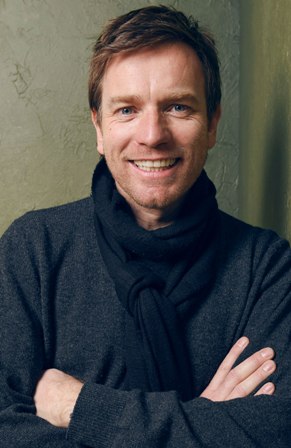 Whenever someone turns up to write about him, McGregor has complained, they only want to talk about two things: 1) How frequently he drops his trousers onscreen and 2) How he’s now a teetotaler. Yet each is true. McGregor has done more full-frontal nudity than any other A-list actor working today, to the delight of both those who prize realism in film and the compilers of YouTube sizzle reels. When he played an Iggy Pop–like glam rocker in Todd Haynes’s Velvet Goldmine (1998), McGregor flashed his Little Ewan, as it’s been called, in true Jim Morrison fashion. In Peter Greenaway’s 1996 film The Pillow Book, he was naked for nearly the whole movie and shared a love scene with a seventy-five-year-old Japanese man. McGregor was worried about his parents sitting through that one. After a screening, his father faxed him a note that said, in its entirety, “I’m glad you inherited one of my major attributes.” As an actor, McGregor is fearless about portraying sexuality on the screen. Velvet Goldmine contains a dream sequence in which McGregor locks lips with a David Bowie–like Jonathan Rhys Meyers in what Out magazine said may be “the most satisfying gay kiss ever committed to film.”
Whenever someone turns up to write about him, McGregor has complained, they only want to talk about two things: 1) How frequently he drops his trousers onscreen and 2) How he’s now a teetotaler. Yet each is true. McGregor has done more full-frontal nudity than any other A-list actor working today, to the delight of both those who prize realism in film and the compilers of YouTube sizzle reels. When he played an Iggy Pop–like glam rocker in Todd Haynes’s Velvet Goldmine (1998), McGregor flashed his Little Ewan, as it’s been called, in true Jim Morrison fashion. In Peter Greenaway’s 1996 film The Pillow Book, he was naked for nearly the whole movie and shared a love scene with a seventy-five-year-old Japanese man. McGregor was worried about his parents sitting through that one. After a screening, his father faxed him a note that said, in its entirety, “I’m glad you inherited one of my major attributes.” As an actor, McGregor is fearless about portraying sexuality on the screen. Velvet Goldmine contains a dream sequence in which McGregor locks lips with a David Bowie–like Jonathan Rhys Meyers in what Out magazine said may be “the most satisfying gay kiss ever committed to film.”
He quit drinking in 2001. There had been bad scenes and nights he could not remember, some spent in London with friends like Jude Law and Angelina Jolie. His mouth, in those hazy days, got him into trouble, too. He criticized Hugh Grant’s acting and called David Letterman a “rather arrogant and uninteresting” man. About the actress Minnie Driver, he commented, “She’s gone mad, mad. She goes to the opening of an envelope.” He described the filming of Attack of the Clones (2002), the second of the three Star Wars movies he made, as “the epitome of tedium.” He doesn’t miss drinking, he says. Unprompted, he tells me what to consume when I hit the pubs later that evening. “You should have a pint of Export, a pint of 80 Shilling—it’s quite an Edinburgh thing, a dark beer—and then a little nip of Scotch whisky,” he says. This turns out to be some of the most artful drinking advice I’ve ever received. McGregor quit drinking, too, because he’d become a family man. In 1995, he married the production designer Eve Mavrakis. They live in Los Angeles now and have four daughters: Clara, who is twenty; Esther, fourteen; Jamyan, fourteen; and Annouk, five.
The media’s focus on his famous penis and infamous drinking habits is among the reasons that, years ago, he quit reading his press—profiles, reviews, any of it. It’s especially dangerous for an actor to read reviews of his stage performances, he says. It’s hard to go on the next night with a critic’s aperçu ringing in your head. “Everyone knows I don’t read reviews,” he says. But he remembers being about to go onstage in London, where he appeared in 2005 in the musical Guys and Dolls, when someone handed him a newspaper, telling him there was a rather nice article about him. He decided to break his rule. “I started reading,” he says, “and the second paragraph was ‘Of course McGregor hasn’t been without his knocks for doing this.’ And it listed every negative critic in one succinct paragraph.” He remembers thinking to himself: Thanks a lot. Now I’ve got to go on and apparently I don’t sing well, I can’t act, and la la la la la.
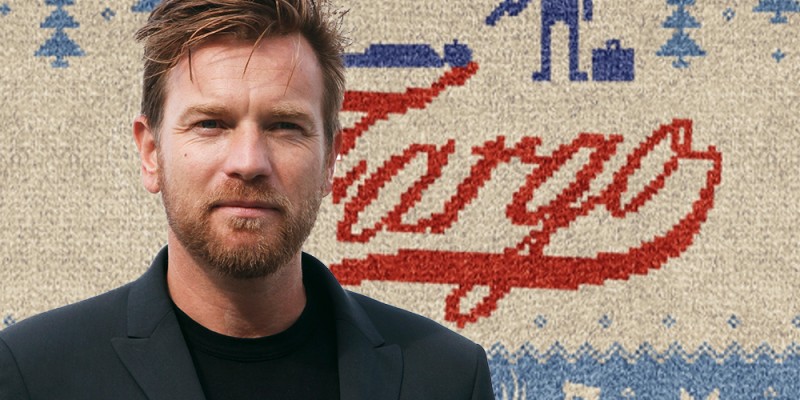 McGregor probably should read his press more often. He’d learn what most serious critics think of his work—that he’s among the most important and least predictable film actors of his age. He’s a busy, committed actor who moves easily between blockbusters (he starred in three Star Wars prequels as Obi-Wan Kenobi, the legendary Jedi), action movies (Black Hawk Down), musicals (Moulin Rouge!), light Woody Allen comedies (Cassandra’s Dream), intellectual thrillers (The Ghost Writer), character studies (Beginners, with Christopher Plummer), voice-over roles for animated family films (Robots), and friendly popcorn movies like Tim Burton’s Big Fish. In between there have been roles in dozens of smaller art-house films of the sort he prizes. Most recently, he played a journalist in Don Cheadle’s bio-pic Miles Ahead, about the life of the jazz trumpeter Miles Davis, and both Jesus and Satan in Last Days in the Desert, a film by Rodrigo García, the talented son of the Nobel-prize-winning Colombian writer Gabriel García Márquez. Many of these smaller films are excellent. At other times, McGregor seems to be taking career advice from Elvis Costello, who wrote in Unfaithful Music & Disappearing Ink, his recent memoir, “If you intend to have a long career in show business, it is necessary to drive people away from time to time, so they can remember why they miss you.”
McGregor probably should read his press more often. He’d learn what most serious critics think of his work—that he’s among the most important and least predictable film actors of his age. He’s a busy, committed actor who moves easily between blockbusters (he starred in three Star Wars prequels as Obi-Wan Kenobi, the legendary Jedi), action movies (Black Hawk Down), musicals (Moulin Rouge!), light Woody Allen comedies (Cassandra’s Dream), intellectual thrillers (The Ghost Writer), character studies (Beginners, with Christopher Plummer), voice-over roles for animated family films (Robots), and friendly popcorn movies like Tim Burton’s Big Fish. In between there have been roles in dozens of smaller art-house films of the sort he prizes. Most recently, he played a journalist in Don Cheadle’s bio-pic Miles Ahead, about the life of the jazz trumpeter Miles Davis, and both Jesus and Satan in Last Days in the Desert, a film by Rodrigo García, the talented son of the Nobel-prize-winning Colombian writer Gabriel García Márquez. Many of these smaller films are excellent. At other times, McGregor seems to be taking career advice from Elvis Costello, who wrote in Unfaithful Music & Disappearing Ink, his recent memoir, “If you intend to have a long career in show business, it is necessary to drive people away from time to time, so they can remember why they miss you.”
There’s a sense of both commitment and abandonment in all of McGregor’s performances. His enemy is stasis. “Very big studio pictures are tedious to make,” he says. “If you’ve got eighty people in your crew, as opposed to two or three, suddenly you’re with all these massive fucking egos walking around. All that takes up time and money, which is why they take five months to shoot. Everyone’s quite happy if you come home having done a third of a scene. I can’t stand it. As a Scottish working man, I’m like, ‘Fucking get on with it.’ ”
While he’s talking about his choices as an actor, you begin to realize what a profound professional homecoming it is for McGregor to be in Scotland working with Danny Boyle again.
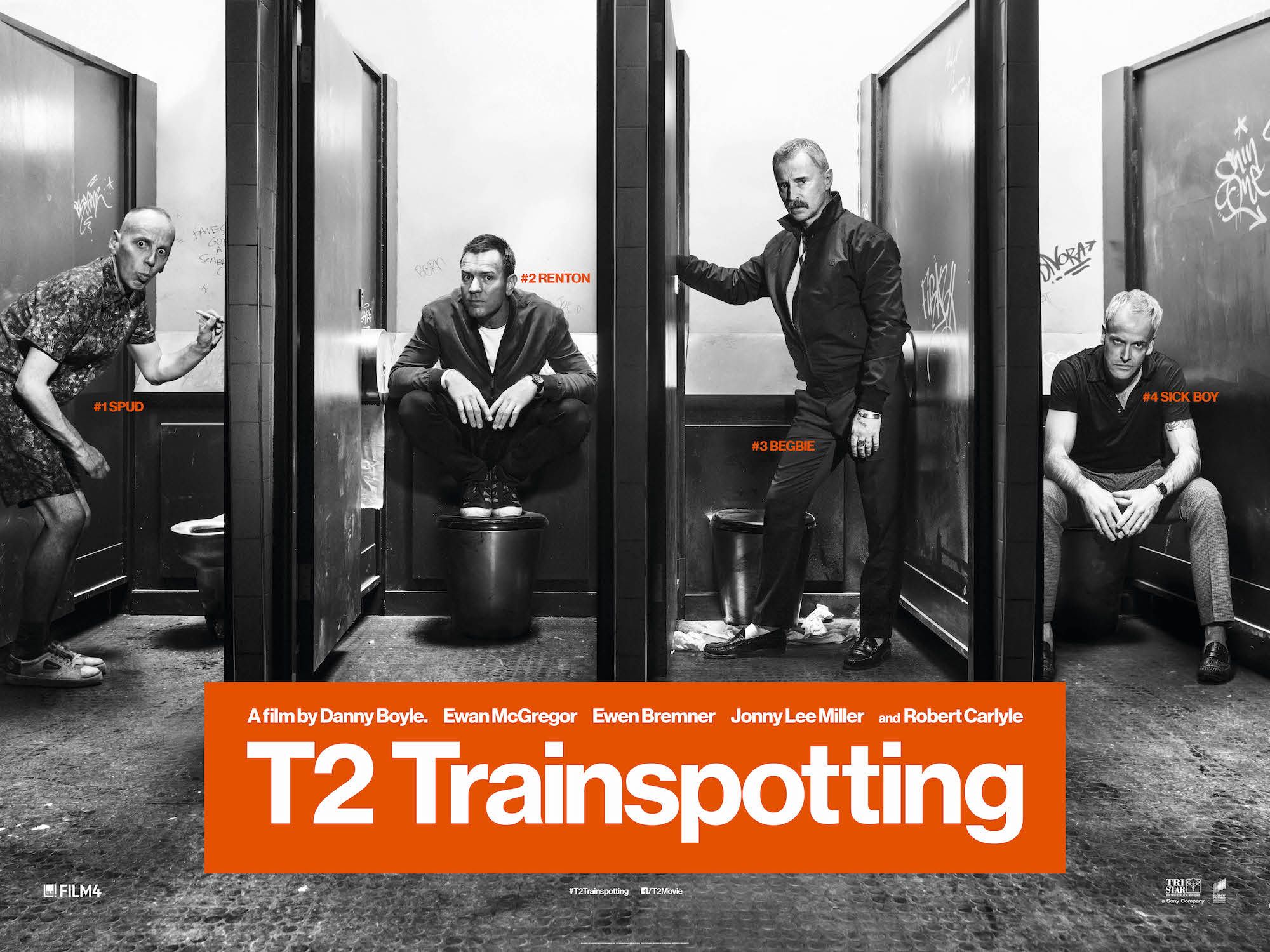 The Trainspotting sequel, which is titled T2: Trainspotting, is the first movie he’s made with the British director in nearly twenty years. They were once inseparable. McGregor starred in Boyle’s first three films, each uncommonly intelligent and alive: Shallow Grave (1994), Trainspotting, and A Life Less Ordinary (1997).
The Trainspotting sequel, which is titled T2: Trainspotting, is the first movie he’s made with the British director in nearly twenty years. They were once inseparable. McGregor starred in Boyle’s first three films, each uncommonly intelligent and alive: Shallow Grave (1994), Trainspotting, and A Life Less Ordinary (1997).
Boyle and McGregor made their names together. “Danny was my first movie director and the most important of my life, because I was part of his filmmaking team for those three first movies,” McGregor says. “It was who I was. I thought: I’m Danny Boyle’s actor.” But when it came time to film his fourth feature, The Beach (2000), Boyle passed McGregor over in favor of Leonardo DiCaprio. Wounded, McGregor fell into the welcoming arms of George Lucas, the Star Wars director. These prequels were vastly successful but critically dismissed, and in them McGregor sometimes seemed bored and distracted. He’s an unconventional actor given to unconventional roles, and he looked vaguely sheepish wielding a powder-blue light saber.
We’re nearing the bottom of the hill. A woman and her twenty-something daughter spy McGregor and make a noise as if they’ve seen a baby seal holding flippers with a baby penguin. While McGregor poses for a photograph with the daughter, the mother says, “You inspired her to go to Mongolia.” This is a complicated reference. She might be alluding to Jamyan, McGregor’s third daughter, whom he and his wife adopted from Mongolia in 2006. She might also be alluding to McGregor’s nineteen-thousand-mile motorcycle ride in 2004 with his friend, the actor Charley Boorman. They barreled through Mongolia while traveling from London to New York by way of Europe and Asia in a dust-filled adventure that became a book and a seven-hour television documentary called Long Way Round. (McGregor and Boorman followed up this trip by riding fifteen thousand more miles, in 2007, from Scotland to South Africa.) McGregor doesn’t ask. He merely says to mother and daughter, “Cheers.”
McGregor has a collection of vintage motorcycles; he still rides whenever he can. When he needs to clear his head, he rockets off and winds through, among other places, Palomar Mountain, some hundred miles from L. A. His wife hasn’t asked him to quit; she knows how important biking is to his sanity. “I don’t see it as an inherently dangerous thing to do,” he tells me. “I mean, I don’t get on my bike and think, Fuck, I hope I make it.” I ask how he’d feel if one of his daughters bought one. He laughs mightily. “I’d say, ‘Get off that, it’s too dangerous!’ ”
There’s a strange and touching moment in McGregor’s new film American Pastoral in which he’s portrayed in makeup as a wrinkled and blinkered old man, the Swede in his eighties. It’s a very Philip Roth moment, in a way. So much of his writing is about the things sons owe to their fathers, and vice versa. To make sure the details were right, McGregor gave the makeup team photographs of his own father. The experience of seeing himself as his forebear spooked him and made him think about his own future as husband, father, actor, and director. McGregor looks preternaturally young for his age.
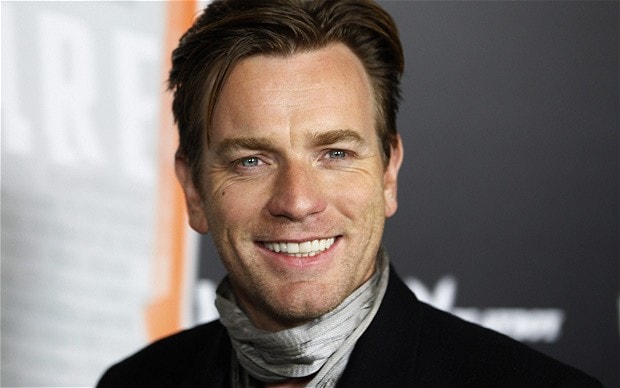 What’s more, at forty-five he’s in the best shape of his life. He’s been reading Christopher McDougall’s book Born to Run: A Hidden Tribe, Superathletes, and the Greatest Race the World Has Never Seen (2009), and it’s pushed him as a runner. He’s now doing 10Ks at least five times a week in and around Edinburgh. Still, there’s a hint of gray at his temples. Aging is on his mind, too, he says, because in the Trainspotting sequel Boyle has been intentionally lighting the actors harshly to highlight the lines on their faces. The second half of McGregor’s career is wide open in front of him, and one thing he hopes to do more of is get behind the camera.
What’s more, at forty-five he’s in the best shape of his life. He’s been reading Christopher McDougall’s book Born to Run: A Hidden Tribe, Superathletes, and the Greatest Race the World Has Never Seen (2009), and it’s pushed him as a runner. He’s now doing 10Ks at least five times a week in and around Edinburgh. Still, there’s a hint of gray at his temples. Aging is on his mind, too, he says, because in the Trainspotting sequel Boyle has been intentionally lighting the actors harshly to highlight the lines on their faces. The second half of McGregor’s career is wide open in front of him, and one thing he hopes to do more of is get behind the camera.
He filmed American Pastoral in Pittsburgh because some of its urban and industrial blocks resemble Newark’s back in the mid-twentieth century, and frankly because it was cheap to work there. As a first-time director, McGregor had to prove he could deliver on time and on budget. He took a tiny salary. Still, he managed to attract a host of gifted actors, and the film is a small anthology of memorable performances. Chief among them are Jennifer Connelly’s as the Swede’s wife, Dawn, a former beauty queen who seeks more gravitas from life, and Dakota Fanning’s as Merry, his bomb-throwing daughter. “The movie has five really stonking female parts in it,” McGregor tells me. “Did you just saying stonking?” I ask. “Yes,” he says. “Stonking.”
It’s later that afternoon, and we’re sitting in a small Edinburgh coffee shop, not far from where he is filming T2. He’s ordered a cheese scone and a sparkling water. We’re talking about casting American Pastoral. He’s particularly proud to have the Bronx-born actor Peter Riegert—he’s perhaps most famous for playing Donald “Boon” Schoenstein in Animal House—portray Lou Levov, the Swede’s blunt, warm, old-school Jewish father. In Roth’s novel, as in the movie, Lou gets the best lines. When the Swede buys an expensive minimalist painting, Roth’s Lou looks at the thing and comments, “Awful lot of money for a first coat. What’s it going to be?” McGregor has a deep regard for Riegert’s acting. He also loves that Riegert was a star of the 1983 movie Local Hero, a small classic, set in Scotland, that McGregor has watched, he estimates, one hundred times. He’s seen it so often in part because it also featured McGregor’s uncle, the actor Denis Lawson. McGregor, who was born in Perth in 1971, didn’t grow up in an artistic or theatrical family. His father was a gym teacher; his mother worked with special-needs children. But Lawson, his mother’s brother, was an inspiration and later a mentor for him. By acting in the Star Wars franchise, McGregor was following his uncle’s lead. Lawson had appeared as Wedge Antilles, a young rebel pilot, in the original three Star Wars films.
The hardest thing about directing for the first time, McGregor says, may have been learning to give actors notes on their performances. That’s because, for an actor, giving direction to a fellow actor is a serious no-no. Only directors get to do that. “An actor has no business telling another actor what they should be doing,” McGregor says, “but in this case it was my job.” He tells me few notes were necessary on the set of American Pastoral because the level of the performances was so high. Even the smaller performances shine. In what is perhaps the film’s crucial scene, the Swede’s daughter, Merry, is played by the twelve-year-old actress Hannah Nordberg. She and her father are sitting in the front seat of a car, having a talk that will change both their lives.
McGregor had loved Nordberg’s screen test. But he adds, “You don’t really know with children how they’re going to be on set once the cameras are rolling for real. And during that scene, I was sitting there, you know, as the director and actor playing that scene with her just thinking, Oh, fucking yes.”
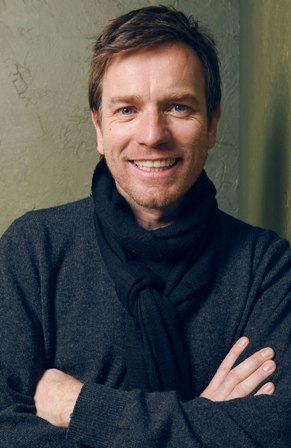 McGregor possesses a lilting Scottish accent. I get to hear an especially florid version of it after he sneezes three times in a row, in the coffee shop, and comments in mock horror, “I think I’m allergic to this cheese scone.” He had to tame that accent in order to play the Swede, the star New Jersey athlete. He wanted to sound New Jersey, but not Jersey Shore New Jersey. “People think you just drop your r’s,” he says of a Jersey accent, “but in fact that’s not the case.” He modeled the music of his American voice on that of Ray Liotta, the GoodFellas star. “I watched a lot of Ray Liotta interviews,” McGregor says. Before takes, he’d tank himself up on the sound of Liotta’s voice and stride onto the set.
McGregor possesses a lilting Scottish accent. I get to hear an especially florid version of it after he sneezes three times in a row, in the coffee shop, and comments in mock horror, “I think I’m allergic to this cheese scone.” He had to tame that accent in order to play the Swede, the star New Jersey athlete. He wanted to sound New Jersey, but not Jersey Shore New Jersey. “People think you just drop your r’s,” he says of a Jersey accent, “but in fact that’s not the case.” He modeled the music of his American voice on that of Ray Liotta, the GoodFellas star. “I watched a lot of Ray Liotta interviews,” McGregor says. Before takes, he’d tank himself up on the sound of Liotta’s voice and stride onto the set.
McGregor has spent a lot of hours reading and rereading Roth’s novel. He likes how Roth “presents many sides of the argument, and you’re left to figure out how you feel about it.” He appreciates, too, how much Roth has to say about things like parenthood and a father’s search for blame. About the Swede and Merry, he comments, “She inherits his strength of character but just in a totally different direction.” Most days on the set, McGregor focused on things like his character’s motivations. But he also got to stage the explosion of the small-town store that Merry bombs. “We had two options: to do it for real or do digital effects. So we shot both, if you like. We shot plates of the store just sitting there, so we could blow it up if we wanted to, then we blew it up for real.” He takes a bite of his scone and says, “We used the real one, of course, because it was so much better.”
Late at night when he can’t sleep, McGregor listens to the radio news, mostly BBC Four. The headlines have been so nightmarish lately that he’s become, almost self-defensively, a political animal. In June, after England voted to remove itself from the European Union, McGregor fired off an expletive-filled tweet in the direction of Boris Johnson, the right-wing Brexit champion who, after the “leave” vote, decided not to run for the Tory leadership. McGregor’s tweet read, “You spineless c$%t You lead this ludicrous campaign to leave EU. Win, and now fuc& off to let someone else clear up your mess.” Talking now about Brexit, he uses words and phrases like “fuckwits” and “Etonian wankers.” He worries he’s not as savvy a political-news consumer as he might be because he tends to take people at their word, “which is a mistake.” At the mention of the Republican presidential nominee, Donald J. Trump, McGregor shakes his head in disbelief and wonders if this tentative moment in history is comparable to Germany before Kristallnacht.
McGregor is not a serious watcher of television. But a few years ago, killing time on a film set in Thailand, he binge-watched The Sopranos, The Wire, and Breaking Bad. (He’s also an enormous fan of the sitcom Broad City, about a pair of hedonistic and raunchy best friends.) These series were so consistently excellent that they made him begin to think seriously about a television role. A year ago, skiing in Utah with his family, he met a producer of the FX series Fargo, who encouraged him to consider acting in it. He loved the original 1996 movie by the Coen brothers but hadn’t seen the show. “I went away and I started watching them,” he says. “I watched them out of order.
I watched the second season first and God, I thought, Jesus, it’s so good. Then I watched the first season and liked that one even more.” He met Noah Hawley, Fargo’s showrunner, and they clicked. Soon McGregor will begin filming the third season of the series. He’ll star as two brothers, Emmit and Ray Stussy, who aren’t twins. One’s a handsome, self-made mogul, “the Parking Lot King of Minnesota.” The other is a balding, potbellied parole officer with a chip on his shoulder because nothing has gone his way. It’s the kind of yin-yang dual performance McGregor was put on this planet for.
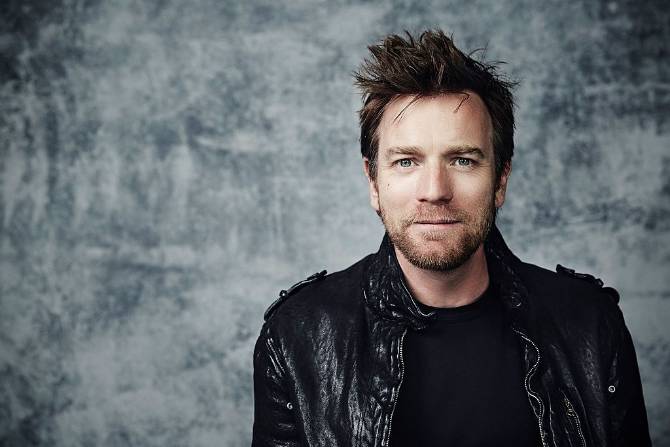 Right now, he’s having a ball on the set of T2 but longing for home and family in Los Angeles. “When I’m home, I’m really home,” he tells me. The family has dinner together every night, “around the table and not in front of iPads and shit like that.” His favorite thing is the school run, the twenty or thirty minutes he gets to talk to his daughters in the car on the way to school. His and his wife’s friends tend to be the parents of his daughters’ friends. He’s proud of being a good provider. About being away so often on film sets, he says, “I’m not in a unique position in being a father who travels for his work. I could be an oil-rig worker. There’s lots of people who are not home on a Monday-to-Friday regular basis.”
Right now, he’s having a ball on the set of T2 but longing for home and family in Los Angeles. “When I’m home, I’m really home,” he tells me. The family has dinner together every night, “around the table and not in front of iPads and shit like that.” His favorite thing is the school run, the twenty or thirty minutes he gets to talk to his daughters in the car on the way to school. His and his wife’s friends tend to be the parents of his daughters’ friends. He’s proud of being a good provider. About being away so often on film sets, he says, “I’m not in a unique position in being a father who travels for his work. I could be an oil-rig worker. There’s lots of people who are not home on a Monday-to-Friday regular basis.”
We pay the check and head out onto a busy Edinburgh street. Up above us, in the distance, there’s the volcano. He’ll climb it again before he leaves Edinburgh. He can see it all from up there—past, present, and future. McGregor long ago decided, to borrow the first two words of Trainspotting’s famous opening, to choose life.
It’s important to him, he tells me, that his daughters know he likes his work. “I share the excitement of what I do with them. I don’t pretend it’s all [makes a face] ugh. I make sure they know when I’m going off on a work trip that I’m going away to do something that I love.” His oldest daughter, Clara, a junior at New York University, has begun to act in independent films. I ask him if he ever warned his daughters away from acting. “I would never dream of steering them away from it, because the truth is: If you want to do this, you’re gonna do it.”
Source: Esquire.com


















